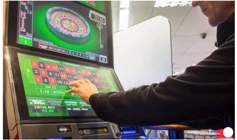Gambling |
| Britain has a highly deregulated gambling industry thanks to sweeping changes made to the betting duty system in a Gordon Brown budget. Chancellor Brown was lobbied by a gambling industry that complained about competition from internet based bookies who did not pay UK tax. |
| Click tax levied at the right rate could level the playing field and allow a return to a more protected gambling regime. This is important because there has been an epidemic in problem gambling. Self exclusions, where gamblers voluntarily ban themselves from gambling, have increased from 11,000 (April 2008 to March 2009) to 42,000 (April 2017- March 2018) according to the Gambling Commission.
| The Guardian
Number of problem gamblers in the UK rises to more than 400,000
Gambling Commission report finds more than 2 million people are addicted to gambling or at risk of developing a problem.
"The temptation is always there: readers on the rise of problem gamblers in the UK.
Rob Davies
Aug 2017 |
| But this is simply the tip of the iceberg since the number only includes self exclusions and only those who have excluded themselves in the 12 month period. It does not include long standing problem gamblers or those who have, for whatever reason, failed to take the self exclusion route.
|
| In August 2017 the Guardian ran a report suggesting that there were 400,000 problem gamblers and two million are addicted or at risk of developing a problem. Tracey Crouch, the Tory MP for Chatham, resigned as Sports Minister in protest at a delay in implementing a substantial limit to fixed odds betting terminals. |
| Crouch got her way and the Chancellor of the Exchequer reversed course on FOBT. It was not enough and too late. The amount that British gamblers lose on FOBTs has increased by 73% since 2009, from £1bn to £1.8bn (source Guardian, August 31, 2017).
|
| The Gambling Commission says there were 52,543 employed in traditional betting outlets, 15, 226 in casinos and a further 12,348 in bingo halls, as at March 2018. That amounts to about two employees for every new problem gambler self excluding themselves.
|
| Quite clearly the new betting regime did not protect bricks and mortar betting establishments from their online competitors. According to the gambling industry GGY (which is its measure of revenue) of remote gaming operators increased from £816m (April 2008/March 2009) to £5,351m, bigger than the entire gambling industry was in 2008/9 if you exclude the National Lottery (which was £2.5bn in 2008/9 and about £3bn in 2017/8).
|
| Gamblers used to face betting duty of 6.75% (paid by bookmakers) which was passed on to punters as a 9% tax. Restoring the betting duty would not solve the problem on its own. For a start there is a huge tail of problem gamblers many with wrecked lives who cause huge difficulties and expense to the NHS and social services.
|
|
The Gambling Acts of 2005 and 2014 have resulted in an effective tax rate of between 17.5 and 21.2% (the rate varies each year). This per centage is the tax rate compared to what the gambling industry calls GGY, that is Gross Gambling Yield (how much the operator actually makes). It is not easy to work out tax rates from the Gambling Commission web site.
|
| Click tax would enable a return to a more controlled form of gambling regulation. Gamblers may think twice before laying their money out, if they know they are to be taxed.
| Click to see next page. |
| Click below to see an item or return to index. | |
| <1> Using clicks to create a fairer tax world | |
| <2> Net Neutrality | |
| <3> Collecting the data | |
| <4> Saving the high street? | |
| <5> Gambling | |
| <6> The size of it | |
| Return to index | |
